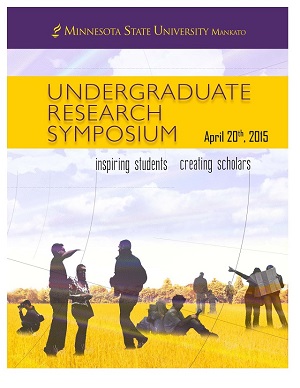How Rural Families Cope when a Loved one is Diagnosed with an Eating Disorder
Location
CSU Ballroom
Start Date
20-4-2015 2:00 PM
End Date
20-4-2015 3:30 PM
Student's Major
Family Consumer Science
Student's College
Allied Health and Nursing
Mentor's Name
Daniel Moen
Mentor's Email Address
daniel.moen-1@mnsu.edu
Mentor's Department
Family Consumer Science
Mentor's College
Allied Health and Nursing
Description
From the lens of the ABCX family stress model (Hill, 1949), this single case study examined the perception, resources, and outcomes of one family in rural Minnesota who effectively adapted after learning that a loved one was diagnosed with an eating disorder. In this study, researchers looked to see what resources and services the family used that helped them during the process of recovery. Additionally, researchers were interested in what services/resources could have been made available to better aid in the process. This rural family was recruited using printed flyers. A qualitative survey was sent out electronically for the whole family to complete. The results were reviewed between two researchers for qualitative salience. The findings suggest that despite the stressor, the family was brought together in the process of recovery. It was also noted that a majority of the family’s support came from close friends. In terms of needs, the family reported a lack of access to comprehensive services as they frequently drove ninety miles or more to obtain proper help. From a clinical standpoint, a majority of earlier research has focused on the pathology of eating disorders and family breakdown. This study has opened the door for additional investigation into rural family strengths/resources. Furthermore findings from this study may be used to shed some light on this underrepresented rural portion of the population in hopes of highlighting effective coping strategies for other rural families. Future studies would benefit from using a broader sample as well as conducting in-person interviews.
How Rural Families Cope when a Loved one is Diagnosed with an Eating Disorder
CSU Ballroom
From the lens of the ABCX family stress model (Hill, 1949), this single case study examined the perception, resources, and outcomes of one family in rural Minnesota who effectively adapted after learning that a loved one was diagnosed with an eating disorder. In this study, researchers looked to see what resources and services the family used that helped them during the process of recovery. Additionally, researchers were interested in what services/resources could have been made available to better aid in the process. This rural family was recruited using printed flyers. A qualitative survey was sent out electronically for the whole family to complete. The results were reviewed between two researchers for qualitative salience. The findings suggest that despite the stressor, the family was brought together in the process of recovery. It was also noted that a majority of the family’s support came from close friends. In terms of needs, the family reported a lack of access to comprehensive services as they frequently drove ninety miles or more to obtain proper help. From a clinical standpoint, a majority of earlier research has focused on the pathology of eating disorders and family breakdown. This study has opened the door for additional investigation into rural family strengths/resources. Furthermore findings from this study may be used to shed some light on this underrepresented rural portion of the population in hopes of highlighting effective coping strategies for other rural families. Future studies would benefit from using a broader sample as well as conducting in-person interviews.
Recommended Citation
McCall, Alexis. "How Rural Families Cope when a Loved one is Diagnosed with an Eating Disorder." Undergraduate Research Symposium, Mankato, MN, April 20, 2015.
https://cornerstone.lib.mnsu.edu/urs/2015/poster_session_B/16




